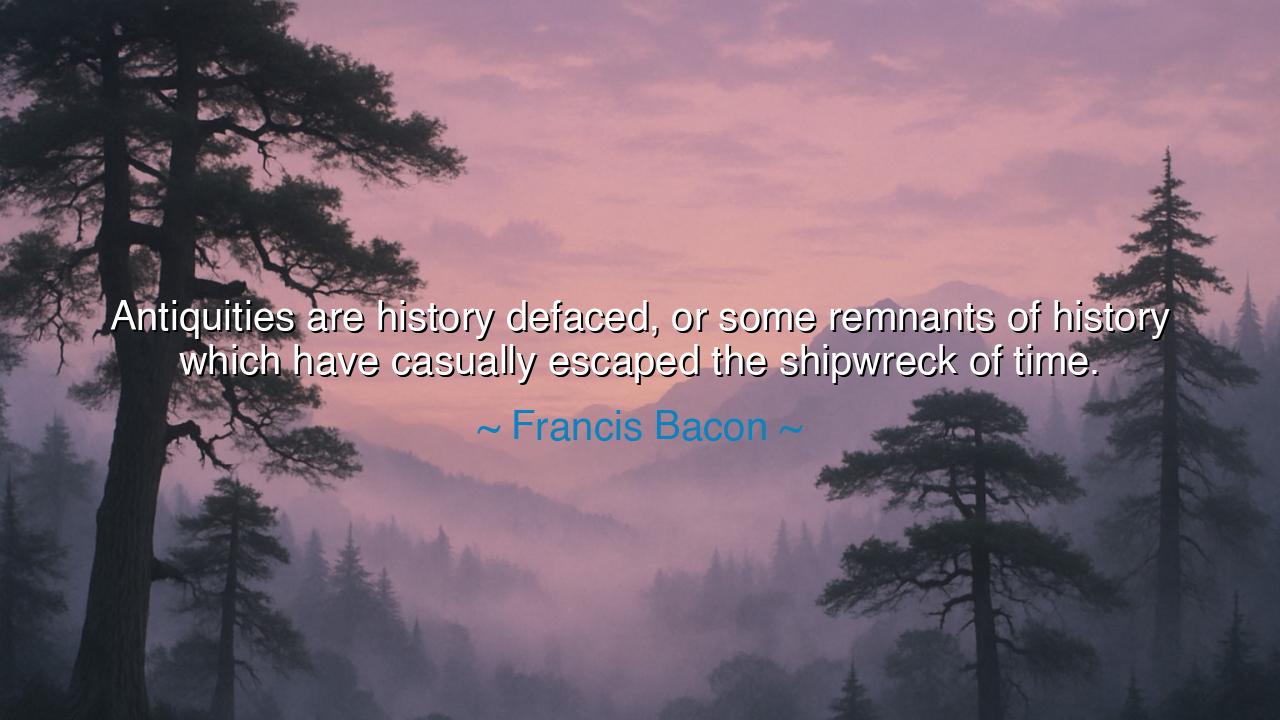
Antiquities are history defaced, or some remnants of history
Antiquities are history defaced, or some remnants of history which have casually escaped the shipwreck of time.






“Antiquities are history defaced, or some remnants of history which have casually escaped the shipwreck of time.” — Francis Bacon
Hear these words, O children of the ages, and understand their gravity. When Francis Bacon, philosopher of reason and servant of wisdom, spoke of antiquities, he was not merely naming old stones or forgotten scrolls. He was speaking of the fragments of memory left behind by a world that once lived, breathed, and believed. He saw in these relics not perfection, but ruin—the wreckage of empires and the whispers of vanished hearts. For to him, antiquities were both a blessing and a wound: “history defaced,” marred by the passing of centuries, yet miraculously “escaped from the shipwreck of time.”
In those words lies a profound vision of mortality. Bacon reminds us that time is a vast ocean, restless and merciless. Upon its waves rise the ships of nations, glittering with power and promise. Yet one by one, they sink beneath the depths, leaving behind only shards—an inscription half-erased, a statue broken at the knees, a word carved in stone that no longer speaks its full meaning. These are our antiquities: the survivors of oblivion, the fragments of eternity that refuse to die. They are the bones of history, washed ashore by the tides of ages, bearing silent witness to all that was lost.
To grasp this truth, look upon the story of Pompeii. Once a thriving city of laughter and art, it was buried beneath the ashes of Mount Vesuvius, its people entombed in the very moment of their living. For centuries, the city slept beneath the earth, forgotten by the world it once adorned. When it was uncovered, its frescoes were faded, its temples broken, its voices stilled—but its presence spoke louder than words. Here was history defaced, yet also preserved. The people of Pompeii could no longer speak, but their silence became a lesson more powerful than any history book: that even in ruin, the human spirit endures.
Bacon’s insight pierces deeper still. He understood that antiquity is not truth untouched—it is truth scarred. What remains of the past is never the whole. The shipwreck of time has swallowed countless tales—the songs of unnamed poets, the wisdom of burned libraries, the dreams of civilizations erased by war and fire. What we hold in our museums and manuscripts are but echoes, and yet those echoes are holy. They call us to humility, reminding us that we are not the masters of history, but its fleeting custodians. We inherit not perfection, but fragments; and from those fragments, we must rebuild meaning anew.
So let the wise take heed: do not look upon antiquities with mere curiosity or pride. Approach them as one would approach the relics of the dead—with reverence, gratitude, and sorrow. For every column that still stands, a hundred have fallen. Every word that endures in parchment represents a thousand voices the wind has carried away. The beauty of the ancient lies not only in what survives, but in what it teaches us about impermanence—that all human glory, no matter how radiant, must one day bow to dust.
Yet there is hope within Bacon’s melancholy. For though time devours, it also reveals. What survives—no matter how broken—reminds us that memory can outlast destruction. A chipped statue can inspire awe; a torn manuscript can ignite revolutions. Even the faintest remnant of history carries within it the light of all that came before. The shipwreck of time may scatter our creations, but the human desire to remember—to preserve meaning—cannot be drowned. It rises again and again, building new vessels of art, thought, and spirit.
Therefore, O guardians of the present, learn from this truth. Cherish what endures. Record what you witness. Preserve what you love. For what you create today may be tomorrow’s antiquity, and through it, the future will know that you once lived. The hands of time will one day reach for your works, as they have reached for those of Rome, Egypt, and Greece. Build not only for yourself, but for the unseen generations who will inherit your fragments. And when they find them—weathered, scarred, yet surviving—they will know that you, too, sailed upon the sea of time, and that your light, however faint, escaped the shipwreck.






AAdministratorAdministrator
Welcome, honored guests. Please leave a comment, we will respond soon